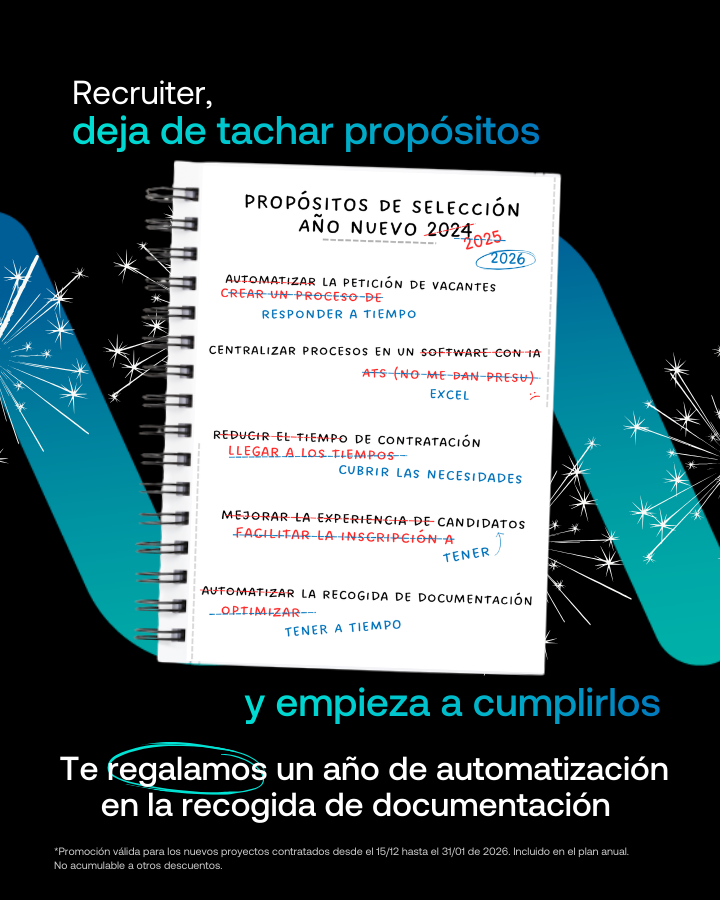Interview assessment test: How to ask, evaluate and hire smarter

What is an interview assessment test and why does it matter?
Evaluating competencies beyond the resume
The interview assessments are a selection method that makes it possible to evaluate in a structured way the abilities, behaviors and attitudes of a candidate in the face of real situations in the position.
Unlike a traditional interview, it focuses not only on the candidate's trajectory, but on how they have acted in past experiences and how they could perform in the future.
The most notable benefits are:
- Reduce subjectivity in the selection process.
- Identify the candidate's real fit for the position and company culture.
- Improve the prediction of work performance.
Benefits over traditional interviews
In a traditional interview, general questions predominate, such as “Tell me about yourself” or “What's your biggest weakness?”, which tend to result in responses that are not comparable between candidates.
On the other hand, in a competency-based interview, the questions follow a structured format (example: STAR method: Situation - Task - Action - Result), which allows obtaining concrete and measurable information about the candidate's way of acting.
Supporting smarter, unbiased hiring decisions
This approach is especially useful in:
- High-volume hiring processes, where objectivity is key.
- Selection of strategic profiles that require critical soft skills (leadership, communication, problem solving).
- Companies that want to reduce turnover and improve the quality of hiring.
Types of Interview Assessment Tests and When to Use Them
Psychometric, technical, and situational tests
The key is to design questions that force the candidate to describe real situations. To be useful to the recruiter, it is advisable to:
- Adapt the question to the role and hierarchical level. The same competencies are not evaluated in a junior profile as in a manager.
- Use clear rating scales. Define in advance what behaviors are considered “high”, “medium” or “low” performance.
- Avoid questions that are too general. The more contextualized the question is, the more comparable the answers will be.
Practical example:
- Instead of “How do you work under pressure?”, ask:
“Describe a time when you had to submit a project with a very tight deadline. What steps did you take and what result did you get?”
Choosing the right assessment for each role
- Soft skills:
- Adaptability: “Tell me about a situation where you had to change your strategy quickly.”
- Communication: “Tell me about an experience in which your way of communicating impacted the final result.”
- Leadership: “How did you manage a conflict within your team and what did you learn from that experience?”
- Teamwork: “Describe a time when your collaboration was key to achieving a common goal.”
- Technical competencies (hard skills):
- Programming: “Explain to me a project where you had to develop code under pressure. How did you ensure quality?”
- Languages: “Give me an example of a presentation or negotiation you made in another language.”
- Project Management: “Describe to me how you organized a complex project and what tools you used.”
- Excel/analytics: “Give me an example of how you structured data in Excel to make an important decision.”
The ideal is combine questions about soft skills and hard skills to have a comprehensive view of the candidate's profile.
How to Optimize Candidate Evaluation with Digital Tools
Automate interview assessments with smart platforms
Digitalization has transformed the way we evaluate competencies. With a Selection assessment you can take this process to another level:
- Standardization of criteria: all candidates are evaluated under the same frame of reference, which eliminates subjectivities.
- Intelligent automation: The Recruiters they stop investing time in administrative tasks (collecting responses, consolidating evaluations, transcribing notes) and can focus on strategic analysis.
- Advanced analytics with AI: artificial intelligence algorithms detect patterns in responses, identify key competencies and suggest objective rankings of candidates.
- Bias reduction: by applying evidence-based evaluation models, the risk of conscious or unconscious discrimination is minimized.
- Smoother candidate experience: by having digitized processes, the candidate perceives an innovative and efficiency-oriented organization.
In short, AI does not replace the recruiter, but rather empowers them, freeing up time for human and strategic contact in the final decision-making phases.
Use multilevel evaluation to compare candidates efficiently
Multilevel evaluation digitized not only centralizes the feedback of different evaluators (recruiters, managers, even team members), but it also allows apply different types of custom tests that enrich the interview by competencies:
- Structured video interviews, with pre-recorded questions to evaluate communication, self-management and verbal expression.
- Language tests, essential in international or commercial profiles.
- Technical programming tests with simulated environments.
- Excel and analytics exercises, for financial or management positions.
- Virtual teamwork dynamics, which allow us to observe collaboration and problem solving in real time.
Thanks to this combination of tests and the multilevel vision, the recruiter obtains a 360° evaluation of the candidate, more complete and objective than can be achieved with a face-to-face interview alone.
.jpg)
Fulfill your selection purposes
Recruiter, fulfill your recruitment purposes in 2026 with the help of Velora. And as a gift, a free year on automatic document request.

Related articles
More articles to inspire your HR strategy









